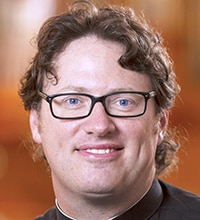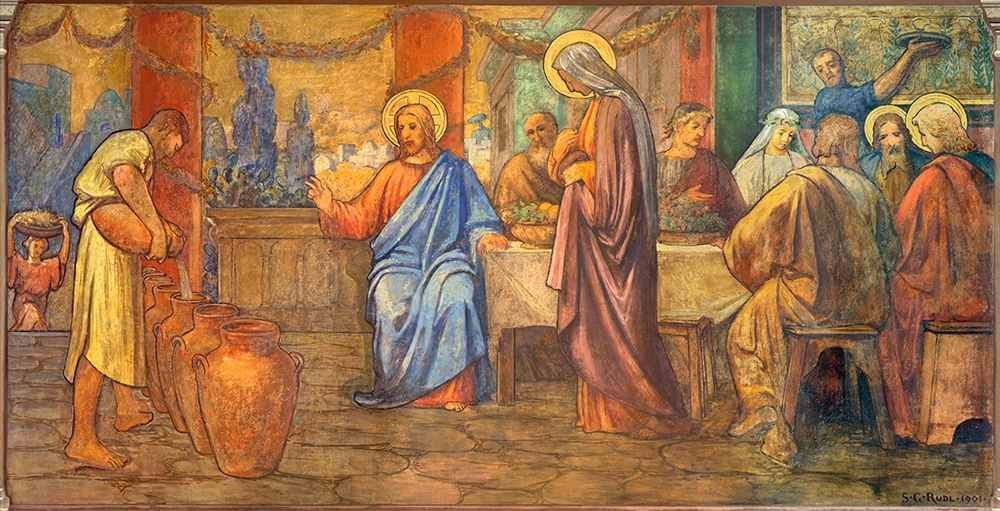
The wedding at Cana belongs, as we’ve seen, to the tria miracula of the season, alongside the visit of the Magi and the baptism of Jesus, which we’ve already celebrated. Clearly, the Church wants us to dwell upon all these mysteries, still lingering in the light of Christmas, before moving on to the more ordinary readings of Ordinary Time. Why rush on from this beautiful season, that beautiful birth, the beautiful adoration of such a beautiful Epiphany? Continue to contemplate this wondrous thing — the Church seems to say — and adore this born Christ in these splendorous mysteries.
And so, we go to Cana and to that wedding. In meditation, we are guests just like Jesus and his disciples. And we know the story. Through wine, Jesus’s mother asks his help. After some mysterious dialogue, the new wine comes, more abundant and better than anything any of the guests could have anticipated. It’s a miracle, a sign, and his disciples begin to believe in him (cf. Jn 2:11).
| January 16 – Second Sunday in Ordinary Time |
|---|
|
Is 62:1-5 |
Its first meaning is theological. The miracle itself — that water was made wine — shouldn’t astonish us, St. Augustine said in a homily on the Gospel of John. God does things like this all the time in vineyards all over the world. Rather, contemplating this “beginning of his signs” (Jn 2:11), we should look deeper. “He was suggesting something to us,” Augustine said, “some mystery … hidden in the deed.”
Theologians, scholars and spiritual masters have, in fact, discerned a great deal in this story, innumerable symbols and allusions — some more profound than others. For instance, in the timing of the miracle — that it happens on the “third day” (Jn 2:1), but which, counting from the beginning of the Gospel, is also a seventh day — some see a double allusion to new creation and resurrection. Others see in the dialogue between Jesus and his mother — that he calls her “Woman” (Jn 2:4) — a triple allusion to Eve (cf. Gn 3:15), to the woman clothed in the sun (cf. Rv 12:1-6) and to crucifixion (cf. Jn 19:26), all of it revealing Mary to be the second Eve. And others see in the sheer amount of wine — “twenty to thirty gallons” (Jn 2:6) — the kind of Messianic abundance the prophets dreamed of.
For me, what speaks the most is that it’s a wedding banquet. This, of course, evokes the great nuptial analogy, the enduring image of God wedded to Israel (cf. Hos 2:21). What makes the miracle at Cana a “sign” — the first of seven signs in John — is that it signals the messianic fulfillment of this great nuptial image.
This is why, for the first reading, we hear from Isaiah of the espousal of the land and of a young man marrying a virgin (cf. Is 62:5). The wedding at Cana recalls that prophetic image; and further, as one prophetic image gives way to another, at Cana, the virgin mother of Jesus — symbolizing a new Israel, the Church — is, in a mystical sense, betrothed to her own divine Son. But even that prophetic image gives way to yet another. And that’s because Cana in turn signals the marriage of the Lamb to the bride who’s made herself ready (cf. Rv 19:7). Which is, finally, the whole point of the story: that Jesus is the Messiah, the bridegroom, and that we, the Marian Church, are the bride.
But what does any of this have to do with us today? Think about what the Church has been telling us these past few weeks: Christ is coming; Christ is born; Christ is Lord of all nations; Christ is human and divine, the baptized beloved Son; Christ is the Messiah. And then recall that Cana was a banquet, that the wedding guests were nourished there. And then remember the altar in your parish church. Think of what happens there. Listen at Mass to those words your priest will say — “Blessed are those called to the supper of the Lamb.” And remember it’s a wedding supper, and that it includes you.
Father Joshua J. Whitfield is pastor of St. Rita Catholic Community in Dallas and author of “The Crisis of Bad Preaching” (Ave Maria Press, $17.95) and other books.





